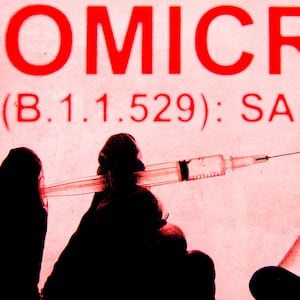The heavily mutated Omicron variant of the coronavirus appears to make two vaccine doses far less likely to protect people from becoming infected with COVID-19, according to a huge new study from South Africa.
However, there are encouraging signs that it causes less severe disease, and vaccinated people are still much less likely to end up in hospital.
The real-world study was carried out by health insurer Discovery Health, and the findings were based on more than 211,000 positive COVID test results from Nov. 15 to Dec. 7. Around 78,000 of the cases were attributed to Omicron, which was first identified in South Africa last month.
The study was carried out in collaboration with South Africa’s Medical Research Council, and the results—which, at this stage, are only preliminary—contain both good news and bad news.
First, the bad: Two doses of Pfizer-BioNTech were found to offer 70 percent protection against hospitalization during the study’s time period, and 33 percent protection against infection. That’s way down from the 80 percent protection against infection and 90 percent efficacy against hospital admission during South Africa’s outbreak of the Delta variant.
However, the study also showed that Omicron appears to cause less severe illness than earlier variants. The findings show that the risk of hospital admissions among adults who caught COVID in November and early December was 29 percent lower than it was in March 2020.
Discovery Health slapped a caution on its results—the number of Omicron cases in the study is only an estimate rather than confirmed through testing, and the work has not yet been peer-reviewed.
However, South African scientists previously found that the variant is driving a recent fourth wave in cases, and that has coincided with the tests used for the real-world study. The South African study also aligns with smaller British study on the Omicron variant that was released last week that underlined the importance of getting a booster dose.
Discovery’s CEO, Ryan Noach, said: “The Omicron-driven fourth wave has a significantly steeper trajectory of a new infections relative to prior waves... National data show an exponential increase in both new infections and test positivity rates during the first three weeks of this wave, indicating a highly transmissible variant with rapid community spread of infection.”
He added: “What is encouraging at this stage is a flatter trajectory of hospital admissions indicating likely lower severity of this wave.”
The study also emphasized that, although the 70 percent protection against severe complications in vaccinated adults is a material drop from the initial 90 percent, it should still be considered “very good protection.”
In more encouraging news, the study also showed that the 70 percent protection against hospital admission holds up well among vaccinated people even when they’re older, with a slight drop for over-60s.
However, Discovery did warn that its study showed children to have a 20 percent higher risk of hospital admission during the Omicron wave than they had in mid-2020, even though pediatric cases are still rare. “This is early data and requires careful follow up,” said Shirley Collie, who is the chief health analytics actuary at the health insurer.
If the drop in vaccine effectiveness is confirmed, then a third booster dose appears to be crucial in restoring much of the lost efficacy. Last week, a study from Britain’s Health Security Agency found vaccines offered much lower levels of protection against symptomatic infection with Omicron, but that was restored to over 70 percent after a Pfizer booster.








